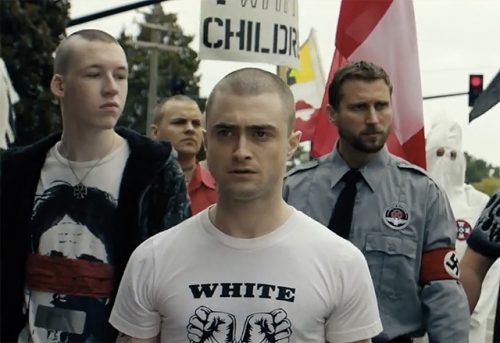Imperium: Sympathy for the Devils, by Tyler Smith
Daniel Ragussis’ Imperium is by far one of the best examples I’ve seen of how true artistic commitment (on the part of the filmmaker and the performers) can elevate run-of-the-mill material into something special. We’ve seen undercover stories before, and Imperium doesn’t necessarily bring anything new to this type of film. However, the cast is so sensitive to the nuances of their characters that eventually the story feels as fresh and alive as any I’ve seen in recent memory.
The story is fairly simple, with introverted FBI agent Nate Foster (Daniel Radcliffe) going undercover with a group of white supremacists to investigate any possible acts of terror they’re plotting. The deeper Foster goes, the more he gets to know the inner workings – and inner motivations – of these people, until he finally starts to identify with them in ways he never expected.
From The Spy Who Came In From The Cold to Mother Night to Donnie Brasco, the undercover cop/agent genre is one that is full of cynicism and complexity. Invariably, the undercover agent begins to worry that he will lose his identity completely, and wonders if he is in fact doing more harm than good. Imperium fits right into this, especially in the beginning, as the writing is so obvious and on-the-nose that even the committed performances of Radcliffe and Toni Collette as his FBI superior weren’t enough to keep me from rolling my eyes. Fifteen minutes in and the film felt like it was going to be hard work to get through.
Thankfully, Ragussis moves from plot exposition to character study, as Foster slowly gains the trust of the white supremacists. He does this by really listening to them; their frustrations, their fears, and their passions. He soon finds that many of these people aren’t as different from him as they would first appear. Everybody wants to belong, and most people need a cause to fight for. As a loner working for the FBI, Foster certainly understands both of these instincts. And the fact that these people being openly and aggressively racist doesn’t preclude them from being able to laugh and love is all the more disconcerting.
There even comes a moment late in the film in which Foster, experiencing a genuine existential crisis, turns to Gerry (Sam Trammell), a suburban dad whose racism seems almost friendly in its tone. As Foster vents about his frustrations, it soon becomes clear that he isn’t trying to pump Gerry for information; he simply needs somebody to listen, and Gerry is the closest thing he has to a friend. It’s a surprisingly tender moment, and one that is both unsettling and heartbreaking.
But that is what makes Imperium so compelling. Ragussis understands that the audience is already coming from a place of condemnation of the white supremacist philosophy, so he doesn’t feel the need to push that. Instead, he opts to find the humanity in these characters, delving into how somebody could ever arrive at such toxic beliefs. In doing so, we are given three-dimensional characters that are believable and, at times, even likable.
Much credit is due to the actors involved. As Foster, Daniel Radcliffe is able to capture the intensity of somebody under constant scrutiny by people more than willing to kill him if they have any doubts. Such intensity could cause the character to become one-note, but Radcliffe modulates his performance just enough to convey Foster’s shifting perspective. Toni Collette plays her character as a woman whose arrogance is merely a facade meant to hide a deep insecurity.
As for the white supremacists, the performances are all top notch. As a charismatic on-line talk radio host, Tracy Letts hits all the right notes as a man who knows the audience he is reaching and knows just how best to manipulate their inherent anger. Chris Sullivan and Pawel Szajda play leaders within the “movement”, and they portray these men as eager to trust Foster, but unable to fully let themselves do so. And Trammell’s seemingly boring suburbanite is perhaps the scariest of the bunch, precisely because he seems so mundane and anonymous.
As is the case with any terrorist group, new members are drawn in by a combination of their own frustration and a series of dynamic personalities promising them justice and prosperity. Letts, Sullivan, Szajda, and Trammell are able to capture that element, intriguing the audience in a way that is somehow both unnerving and exciting.
But, on top of that, Imperium suggests that what so many of these people want is to be a part of something bigger than themselves where they can actually make some sort of difference in the world. It is a desire we all have. It leads us to join churches, protest marches, political parties, and charity organizations. But that same impulse can also lead people to join the Ku Klux Klan, or ISIS, or the Manson Family. This unsettling realization – that so many of us could just as easily have gone down a darker path than the one we chose – is what Daniel Ragussis understands, and what his cast commits to showing us. The result is a film that starts as conventional, but quickly moves into something much more dark and engaging.































Excellent review